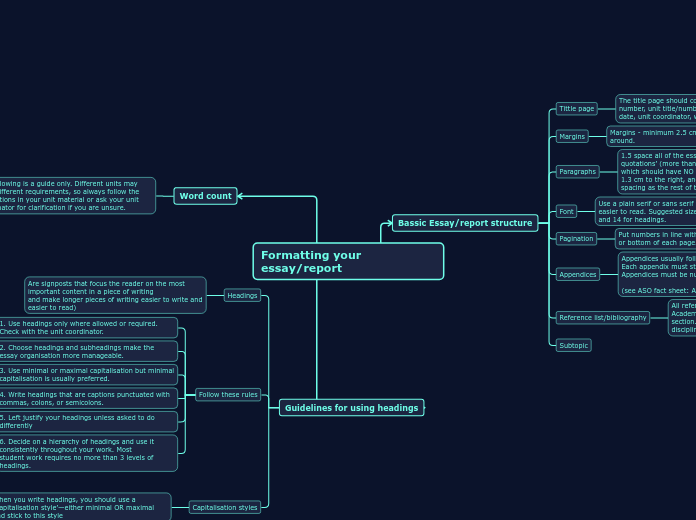Formatting your essay/report
Bassic Essay/report structure
Tittle page
The title page should contain: name, student number, unit title/number, question title/name, due
date, unit coordinator, word count.
Margins
Margins - minimum 2.5 cm, maximum 3 cm all around.
Paragraphs
1.5 space all of the essay paragraphs including ‘long quotations’ (more than 40 words)
which should have NO quotation marks, be indented 1.3 cm to the right, and have the same
spacing as the rest of the essay paragraphs.
Font
Use a plain serif or sans serif front. A serif font is easier to read. Suggested sizes are 12 for the text and 14 for headings.
Pagination
Put numbers in line with the right margin at the top or bottom of each page.
It is also acceptable, although less
common, to centre all page numbers.
Appendices
Appendices usually follow the reference list.
Each appendix must start on a new page.
Appendices must be numbered—A,B,C or 1,2,3.
(see ASO fact sheet: Appendices)
Reference list/bibliography
All referencing lists start on a NEW PAGE. Go the Academic Skills Fact Sheets > Referencing
section. Select the correct referencing style for your discipline.
Subtopic
Word count
The following is a guide only. Different units may have different requirements, so always follow the
instructions in your unit material or ask your unit coordinator for clarification if you are unsure.
Guidelines for using headings
Headings
Are signposts that focus the reader on the most important content in a piece of writing
and make longer pieces of writing easier to write and easier to read)
Follow these rules
1. Use headings only where allowed or required. Check with the unit coordinator.
2. Choose headings and subheadings make the essay organisation more manageable.
3. Use minimal or maximal capitalisation but minimal capitalisation is usually preferred.
4. Write headings that are captions punctuated with commas, colons, or semicolons.
5. Left justify your headings unless asked to do differently
6. Decide on a hierarchy of headings and use it consistently throughout your work. Most
student work requires no more than 3 levels of headings.
Capitalisation styles
When you write headings, you should use a ‘Capitalisation style’—either minimal OR maximal and stick to this style
Maximal
The first letter of every important word should be capitalised. The first
word after a colon is always capitalised.
Minimal
Capitalise the first word, any other word that would normally take a
capital, and the first word after a colon.
